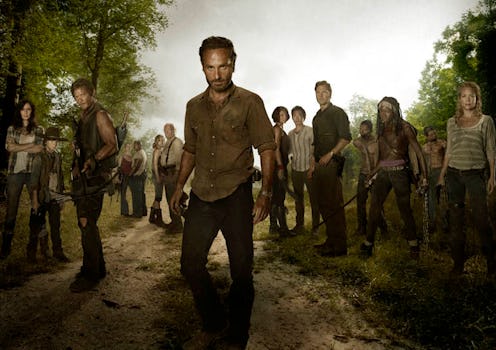
Who knew that watching people stab and shoot zombies in the head could be educational? Whoever chooses the classes at the University of California, Irvine, that's who. The school will offer an online class on The Walking Dead called "Society, Science, Survival: Lessons from AMC's The Walking Dead." It's not even a TV class, either; multiple professors from physics, math, public health and social sciences backgrounds will be teaching the course.
Here's our best guess at what the syllabus looks like.
Society, Science, Survival: Lessons from AMC's 'The Walking Dead.'
Mondays, 12-3 PM
Online only
Required course materials:
The Zombie Survival Guide: Complete Protection from the Living Dead , Max Brooks
The Walking Dead , Vol. 1, Robert Kirkman & Tony Moore
Pride and Prejudice and Zombies , Seth Grahame-Smith
Objective: Over the next eight weeks, we seek to gain an understanding of the popular AMC television series The Walking Dead, through a critical lens with an emphasis on its real world implications and values. This is a course based in science, social science and math, not cinema or television. We will not go over the pacing issues, unrealistic plot twists, acting or unlikeable characters (though extra credit will be offered to anyone who submits a physics-based, detailed analysis of Carl killing Lori). Instead, we will focus on the plausibility of the zombie outbreak, the social issues it causes and survival tactics. However, feel free to express enthusiasm by uploading your favorite scenes to the "Best Zombie Kills" folder on the class website.
Section 1: The First Bite — How Could the Outbreak Have Started?
The Walking Dead TV show has finished three seasons and the comic series has had over 100 issues, and there is still no information about how the zombie disease started or became prevalent. The only provided information was a model of how it affects the brain and a dramatic "we're all infected" whisper. We will create scientifically sound theories on this, which will then be given to series creator Robert Kirkman, since he hasn't figured it out yet either and needs ideas.
Section 2: Same Old Story — Race and Gender in the Post-Apocalyptic American South
Set in Georgia, The Walking Dead takes place in the immediate aftermath of its zombie outbreak, and we are able to see how race and gender come into play in this society. So far on the show, we have seen mostly men take on the roles of leader, protector and provider, while women are mainly responsible for cooking, cleaning, laundry and (attempted) childcare. We will analyze why in a society without rules or a system of imposing gender norms, they have reverted back to traditional roles, and how that can be altered (changing the series' writing staff will not be accepted as an answer).
In the second half of this section, we will look at race. According to the show's representative population, the zombie outbreak affected a larger rate of minorities, as rarely do we see more than two African-American characters at a time. Students will also form scientific hypotheses as to why zombies might be more attracted to minorities, as these characters always seem to die at quicker rates than white characters.
Midterm
A short-answer test on all of the information covered so far in class, as well as questions about potential character motivations, i.e.: Why won't Carl stay in the house? There are no right or wrong answers, grading is based on evidence and support provided.
Section 3: Nomads vs. Settlers — Living Patterns in The Walking Dead
Here we will bring a topic frequently debated on the show into the classroom, as the class is split into groups who must present on which lifestyle is optimal in a zombie-infested world. One side will be "nomads," who research the benefits of traveling frequently, while the others will be "settlers," who research the benefits of staying in one secure location. The class will have one 45-minute debate, which will be taped and sent to The Walking Dead's writers, as their debates tend to last for full seasons and could surely benefit from a more succinct example.
Section 4: Odysseus in a Sleeveless Vest — Daryl as the Ultimate Hero
The course's final section will focus on Norman Reedus' character of Daryl Dixon, specifically, and his role within the series. From a sociological and psychological background, we will explore Daryl as a character and hero, and what motivates him to reach the levels of badass-ery that he does repeatedly throughout the series. Students must try to understand why he is so beloved by all fans and submit proposals of ways that he can overthrow Rick Grimes as the group's leader.
Final
The final will be a paper, 8-10 pages in length, in which students postulate their own ending for the series. Undoubtedly the actual series finale will be disappointing and/or ridiculous, so students will submit their own concepts, rooted in what they've learned through out the semester. Any paper that includes Rick having been in a coma the whole time, with the series as his dream, will automatically receive an F.
[Images: AMC]